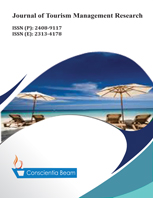A Research on Determinants of Participation Intention in Medical Tourism to Korea -Focused on Mongolian Customers
DOI:
https://doi.org/10.18488/journal.31.2019.61.19.28Abstract
Due to the geographical proximity and popularity of Korean dramas in Mongolia, Mongolian trip to Korea is growing rapidly, especially in medical tourism such as plastic surgery, skin care, and general health care. Therefore, it is important to find what drives Mongolian consumers to choose Korea as a medical tourism destination. Based on the empirical findings of prior literature, it was hypothesized that medical tourism cost, medical service, medical technology, medical tourism accessibility, and tourism service are significant determinants to drive Mongolian medical tourism destination. In this study, we conducted a survey for choosing Korea as a medical tourism destination for 894 people living in Korea and Mongolia, age from 20s to 50s. For the analysis, we employed the multiple regression, and the findings suggest that medical technology, cost appropriateness, medical service, and tourism service have a significant influence on Mongolian choice of medical tourism in Korea, but medical tourism accessibility would not have a significant effect on medical tourism destination selection. Our study concludes with managerial implication and future research direction.

